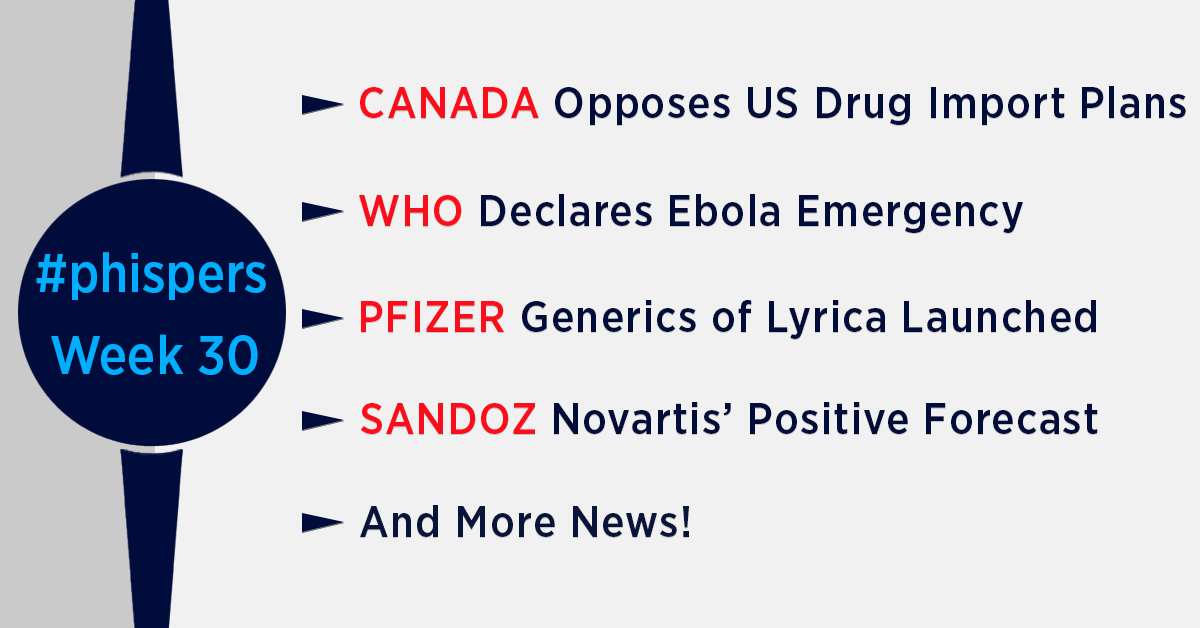
By PharmaCompass
2019-07-25
Impressions: 2772
This week, Phispers brings you news about another setback to the Trump administration’s efforts at tackling high drug prices.
Canada has said it opposes any US plans to buy Canadian prescription drugs that might threaten its drug supply or raise costs for its citizens.
The USFDA approved 10 generics for Pfizer’s Lyrica, sending price down by nearly 98 percent for its consumers.
Novartis raised forecasts for its generic unit — Sandoz — based on its improved performance during the last quarter.
The WHO declared the Ebola virus disease outbreak in Congo a public health emergency.
A federal appeals court in the US upheld the criminal conviction of ‘pharma bro’ Martin Shkreli.
Biohaven Pharmaceutical’s new treatment for Lou Gehrig’s disease failed to get an FDA nod due to Apotex’s manufacturing problems.
The WHO recommended dolutegravir as the preferred HIV treatment.
And Sanofi bought OTC rights in the US for Roche’s Tamiflu.
Biohaven’s new drug fails to get FDA nod due to Apotex’s manufacturing problems
Last week, Biohaven Pharmaceutical Holding Company Limited said the US Food and Drug Administration (FDA) failed to approve its treatment for amyotrophic lateral sclerosis, or Lou Gehrig’s disease.
The company said FDA issued a complete response letter (CRL), raising concerns related to an active pharmaceutical ingredient (API) used in a 2017 study that was made by Apotex Pharmachem India Private Limited between 2014 and 2016.
Biohaven said the API is now being sourced from another supplier, with which no chemistry, manufacturing, and control issues have been identified.
Amyotrophic lateral sclerosis is a rare neurologic disease, which mainly affects the nerve cells responsible for controlling voluntary muscle movement such as walking or talking.
FDA posts Indoco’s warning letter: Last week, Indoco Remedies had shared that it has received a warning letter for its tablet manufacturing operations. The FDA recently posted the letter on its site. As PharmaCompass had previously reviewed the Form 483 issued after inspection, the warning letter does not contain any surprises.
The FDA has raised concerns over Indoco’s process control values, which were inadequately reported in the batch production records. In multiple batch records, handwritten values were routinely within process parameters, while the values recorded by the programmable logic controller (PLC) were frequently outside Indoco’s established process parameters.
The concerns highlighted in the January 2019 inspection were a repeat observation from a previous inspection in March 2018 where similar discrepancies were found between the values in batch records and the PLC data. The warning letter states “the integrity of all data” within Indoco’s manufacturing records “is called into question” by the actions of its staff. The letter also questions Indoco’s practice of investigating deviations.
Dinesh Thakur on Indian drug industry: In an opinion piece published in Stat News this week, the Ranbaxy whistleblower Dinesh Thakur has said that the Indian pharmaceutical industry has lashed back at Katherine Eban’s book ‘Bottle of Lies’.
“This industry, which has rarely been subjected to such rigorous journalistic scrutiny, has lashed back at Eban, attacking her integrity and her work,” Thakur wrote in the article.
The latest salvo comes from Kiran Mazumdar Shaw, who calls Eban’s exposé anecdotal, biased, unfair, and unbalanced, and accuses the author of playing up to the poor perceptions of the Indian pharmaceutical industry and the country. “Shaw did this in a softball interview she gave to an Indian publication in which she is an investor,” Thakur said.
“Her characterization of the problem is unfortunate because it represents a stubborn denial of reality. There are reams upon reams of official documentation showing that the fraud at Ranbaxy was not a one-off event,” Thakur added.
Novartis’ sunny forecast for Sandoz; CEO sets aside US$ 700 million to settle bribery lawsuit
Swiss drugmaker Novartis has been busy overhauling its generics division — Sandoz. Over the last one year, Novartis has offloaded 300 underperforming generics in its oral solids and dermatology product lines to Aurobindo for US$ 1 billion in an effort to turnaround Sandoz.
And if its second quarter earnings figures are to be believed, those efforts are paying off.
Last week, Novartis reported a 3 percent increase in Sandoz’s year-over-year sales during the second quarter — at US$ 2.4 billion — despite price erosion of 7 percent, most of which occurred in the US. And despite pricing pressures in the US, Novartis has raised its full-year expectations for Sandoz from “broadly in line” to “low-single-digit growth”.
Is the company being unrealistic in its expectations? RBC Capital Markets analysts say that Sandoz results look encouraging, but “the declines in the US remain in the mid-teens with [a] turnaround not yet being seen.”
Similarly, analysts at SVB Leerink said Sandoz’s price erosion was better than the 9 percent the company reported in the first quarter, but overall, it “doesn’t appear” to indicate the improving trends in the broader US generics market.
Novartis’ robust guidance also has a lot to do with its promising set of new drugs, such as psoriasis treatment Cosentyx and heart medicine Entresto.
Meanwhile, Novartis CEO Vas Narasimhan has set aside US$ 700 million to settle a US doctor bribery lawsuit. The Swiss pharma giant seeks to close the chapter on allegedly aggressive business practices that had exposed it to litigation risks.
“Consistent with our efforts to resolve our legacy compliance-related allegations, right now we’re working in settlement discussions to resolve the civil suit...on speaker programs and other promotional events that happened between 2002 and 2011,” Narasimhan said. “We’ve provisioned approximately US$ 700 million for any potential settlement.”
Canada opposes US
plans to import drugs; PhRMA steps up its lobbying spend
PharmaCompass has been routinely covering Trump administration’s efforts at tackling high drug prices. Earlier this month, there were reports that the administration is working on allowing the importation of cheaper drugs from other countries.
However, the Trump administration’s efforts received a fresh setback as Canada said it opposes any US plans to buy Canadian prescription drugs that might threaten the country’s drug supply or raise costs for its own citizens.
At least ten US states, including Florida, have passed or proposed laws to allow imports of cheaper drugs from other countries, but actual shipments would not be legal without federal approval. The US Health and Human Services secretary said last week the government was looking into ways to import cheaper prescription drugs from overseas.
Back in April, Canadian officials had cited research suggesting shipments of drugs to the US could cause shortages in Canada. The Canadian government’s position has not changed since then.
Meanwhile, the Pharmaceutical Research and Manufacturers of America (PhRMA), the drug industry’s primary trade group, increased its spend on lobbying during the second quarter.
PhRMA, which represents leading drugmakers, reported spending US$ 6.2 million in the quarter ending June 30, 2019 — a 12 percent increase from US$ 5.5 million in the same period last year. The group reported lobbying on several pieces of legislation that dealt with drug pricing.
Pfizer’s Lyrica goes generic with 10 copycats; price down nearly 98 percent
Last week, the US Food and Drug Administration (FDA) approved the first generic versions of Pfizer’s blockbuster pain drug Lyrica (pregabalin). In this case, there was no 180-day exclusivity period for the first-to-file generic. Instead, Lyrica saw the launch of break-open generics (or generics from three or more suppliers). In such cases, generics can immediately produce massive savings upon release.
The approvals were granted to Alembic Pharmaceuticals, Alkem Laboratories, Amneal Pharmaceuticals, Dr Reddy’s Laboratories, InvaGen Pharmaceuticals, MSN Laboratories, Rising Pharmaceuticals, Sciegen Pharmaceuticals and Teva Pharmaceuticals.
On the market since 2004, Lyrica was singled out by the generic industry’s Association of Accessible Medicines (AAM) as an example of patent abuse. AAM said Pfizer filed 118 patent applications and had 68 patents issued, with Lyrica’s price rising over 163 percent since 2012.
According to pharmacies, they can buy one of the ten generic copycats for somewhere between US$ 15 and US$ 20 per 90-count bottle. That’s US$ 0.17 to US$ 0.22 per capsule, or a 97 percent to 98 percent discount to brand-name Lyrica (which costs US$ 7.50 per capsule).
Pfizer garnered US$ 5 billion in worldwide revenue from Lyrica in 2018, US$ 5.1 billion in 2017 and about US$ 5 billion in 2016.
WHO declares ebola
emergency; Congo’s health minister resigns
Last week, the WHO Director-General Tedros Adhanom Ghebreyesus declared the Ebola virus disease (EVD) outbreak in the Democratic Republic of the Congo (DRC) a Public Health Emergency of International Concern (PHEIC).
The PHEIC emergency provision is the highest level of alarm the WHO can sound and has only been used four times previously. The outbreak in DRC has killed over 1,600 people.
According to a BBC report, the move may encourage wealthy donor countries to provide more cash.
The declaration followed a meeting of the International Health Regulations Emergency Committee for EVD in the DRC. The Committee expressed disappointment about delays in funding which have constrained the response. They also reinforced the need to protect livelihoods of the people most affected by the outbreak by keeping transport routes and borders open.
A report also said that an Ebola patient may have entered Rwanda, suggesting that the deadly virus could spread to Rwanda as well. However, the WHO withdrew that report.
There is a vaccine for Ebola, manufactured by Merck, which is said to be 99 percent effective. It has been given to 170,000 people.
Meanwhile, Oly Ilunga, Congo’s health minister, resigned this week after being stripped of responsibility for managing the country’s Ebola outbreak, potentially paving the way for the introduction of a second vaccine to contain the spreading epidemic.
Ilunga had overseen DRC’s near year-long response to the Ebola outbreak — the second deadliest in history. In his resignation letter, the minister criticized pressure by unnamed “actors” to deploy the second vaccine, manufactured by Johnson & Johnson and backed by the WHO. This vaccine is yet to be used, due to Ilunga’s objections.
Ilunga has said the J&J vaccine has not been proved effective and that deploying a second one would confuse people in eastern Congo, where health workers are struggling to overcome widespread misinformation about the hemorrhagic fever as well as sporadic hostility.
Appeals court
upholds criminal conviction of Shkreli; Holmes, Balwani win order
In the US, a federal appeals court has upheld the criminal conviction of ‘pharma bro’ Martin Shkreli (36), who is serving a seven-year sentence in a federal prison in Pennsylvania.
The panel in the US Court of Appeals for the Second Circuit also upheld the forfeiture (of more than US$ 6.4 million) that a judge had imposed on Shkreli last year when he was convicted on two counts of securities fraud and one count of conspiracy to commit securities fraud.
He was convicted after a 2017 trial in Brooklyn federal court where prosecutors introduced evidence that he had repeatedly lied to investors about the performance of two hedge funds he ran, and then used money invested in those funds to help start the pharmaceuticals company Retrophin. Shkreli was later ousted from Retrophin.
In its ruling, the appeals panel disagreed with Shkreli’s claim that his trial judge’s instructions to the jury at his trial were incorrect and confusing to jurors. “The instruction given here correctly stated the law,” the appeals panel said in its decision. Likewise, the panel dismissed Shkreli’s argument that the forfeiture amount was inappropriate.
Meanwhile, in the Theranos scandal, its founder Elizabeth Holmes and her co-defendant, former Theranos president Ramesh “Sunny” Balwani, won an order requiring regulators to move quickly to turn over troves of documents they say are at the core of their defense.
Holmes’ lawyer had earlier said that this posed as “regulatory haze” in the Theranos founder’s way, preventing her from formulating her defense against the criminal fraud charges.
The US Food and Drug Administration (FDA) has said it may take up to six months to turn over the information Holmes wants, which even prosecutors said in a court filing is “unacceptable.” Government lawyers said if necessary they will subpoena the agency. Holmes and Balwani are also pursuing documents from the Centers for Medicare & Medicaid Services.
Holmes and Balwani say the agency documents are key to rebutting charges that she and Balwani knew Theranos blood tests were inaccurate and unreliable, and misrepresented the capabilities of the company’s testing machines to doctors, patients and investors. Regulators concluded the blood-testing startup’s technology was a threat to patient health and forced the company, once valued at US$ 9 billion, to shut its labs.
WHO recommends
dolutegravir as preferred HIV treatment
The World Health Organization (WHO) has recommended the use of HIV drug dolutegravir (DTG) as the preferred first-line and second-line treatment for all populations, including pregnant women and those of childbearing potential. This recommendation is based on new evidence assessing benefits and risks of the drug.
Initial studies highlighted a possible link between DTG and neural tube defects (birth defects of the brain and spinal cord that cause conditions such as spina bifida) in infants born to women using the drug at the time of conception. This potential safety concern was reported in May 2018 from a study in Botswana that found four cases of neural tube defects out of 426 women who became pregnant while taking DTG. Based on these preliminary findings, many countries advised pregnant women and women of childbearing potential to take efavirenz (EFV) instead.
However, new data from two large clinical trials comparing the efficacy and safety of DTG and EFV in Africa have now expanded the evidence base. The risks of neural tube defects are significantly lower than what the initial studies may have suggested.
“DTG is a drug that is more effective, easier to take and has fewer side effects than alternative drugs that are currently used. DTG also has a high genetic barrier to developing drug resistance, which is important given the rising trend of resistance to EFV and nevirapine-based regimens,” the WHO said in a statement.
Sanofi buys OTC rights in US for Roche’s flu treatment Tamiflu
French drugmaker Sanofi has signed a rights deal with Roche for ‘Tamiflu’ in the United States. The deal gives Sanofi exclusive over-the-counter (OTC) rights to Tamiflu in the US.
Tamiflu is used for the prevention and treatment of flu.
“[A] successful switch of Tamiflu to OTC would support our global cough and cold strategy by expanding into flu with a sustainable point of difference in the market,” Alan Main, executive vice president of Sanofi consumer healthcare, said in a statement. Currently available OTC flu products only alleviate symptoms, while Tamiflu deals with the virus itself.
Roche will focus more on its newly approved Xofluza. With just a single dose, Xofluza could alleviate flu symptoms as fast as Tamiflu, which usually requires twice daily dosing for five days.
The PharmaCompass Newsletter – Sign Up, Stay Ahead
Feedback, help us to improve. Click here
Image Credit : #Phisper Infographic by SCORR MARKETING & PharmaCompass is licensed under CC BY 2.0
“ The article is based on the information available in public and which the author believes to be true. The author is not disseminating any information, which the author believes or knows, is confidential or in conflict with the privacy of any person. The views expressed or information supplied through this article is mere opinion and observation of the author. The author does not intend to defame, insult or, cause loss or damage to anyone, in any manner, through this article.”







